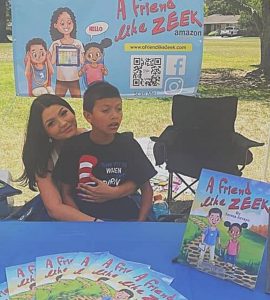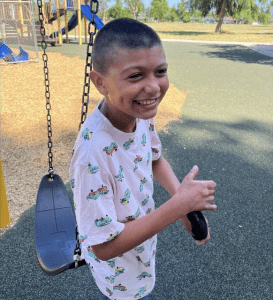Navigating Irony: A Tale of Advocacy and Acceptance
For the past quarter century, English teachers across classrooms have wielded Alanis Morissette’s hit song “Ironic” as a teaching tool. The goal? To unravel the elusive threads of irony and illuminate its nuances for eager students. However, as we delve into the lyrical labyrinth, we find that the song’s examples often lean more toward unfortunate twists of fate than true irony (“A black fly in your Chardonnay”). Let’s revisit the essence of situational irony—a delightful dance between expectation and reality.
Serena Arvayo: A Champion of Autism Acceptance

Meet Serena Arvayo, a resilient single mother navigating life’s complexities alongside her twelve-year-old son, Zeek. Zeek, profoundly autistic, has become the cornerstone of Serena’s mission. What is her mission? To foster Autism Acceptance—a cause close to her heart.
In May 2022, Arvayo penned A Friend Like Zeek, a heartwarming children’s book. Her inspiration? A chance encounter Zeek and an inquisitive six-year-old on a sun-drenched playground. Through this tale, Arvayo sought to bridge the gap between neurotypical children and their autistic peers.
The Weight of Attention
Arvayo’s journey isn’t without its challenges. Every visit to the park casts a spotlight on her and Zeek. As she grapples with social anxiety, the curious glances from other parents weigh heavily. Autistic children, with their unique behaviors, often unwittingly make their parents focal points. Arvayo, ever the observer, found herself often explaining Zeek non-verbal vocalizations—an intricate language of its own.
A Legal Twist Before the Holidays
Last December, just days before Christmas, the very mother who championed awareness and acceptance found herself embroiled in an unexpected legal battle. A neighbor, traumatized by Zeek’s vocalizations echoing through the family’s backyard, filed a lawsuit.
Echoes of the Past
Years earlier, a similar lawsuit had unfolded in the Bay Area. In that case, an autistic child’s behavior—more intrusive this time—had allegedly endangered other neighborhood children and led to garage trespassing. Mediation ultimately resolved the dispute, but the echoes lingered, and this recent incident has stirred memories among the board members of the Autism Society San Francisco Bay Area (SFASA).
As we reflect on this poignant saga, we recognize that irony isn’t confined to song lyrics. It weaves through our lives, sometimes harmonious, sometimes dissonant. Perhaps, in the clash of Zeek’s stimming and the neighbor’s peace, we find our own incongruities—the very essence of situational irony.
Stimming and Strife
In the Arvayo case, as Serena recounts, the central issue revolves around the rhythmic stimming noises emitted by Zeek during his backyard play. However, the neighbor’s claims extend beyond mere stimming. Allegations of disruptive, loud parties at Arvayo’s home have further complicated matters. Arvayo vehemently disputes these accusations, emphasizing that the house is, in fact, rented by her parents. She remains baffled by the neighbor’s insistence on the alleged raucous gatherings—events she cannot recall or fathom.
Despite having moved out of the house six months prior to the lawsuit, Arvayo’s has continued to visit her parents with Zeek, and the neighbor is still pursuing legal action. The weight of this legal battle adds an additional layer of stress to Arvayo’s already demanding life. She recently left her full-time job to homeschool Zeek, who faces academic challenges.
“I’ve deliberately structured my life to avoid courtroom confrontations,” says Arvayo, her voice echoing the strain of the ongoing suit.

A Battle of Perspectives: Advocacy, Stress, and Hope
Arvayo’s response to adversity has been twofold: she seeks public attention and mobilizes support. Media outlets have covered her plight, and her online petition urging the neighbor to drop the suit has garnered over 20,000 signatures. Regrettably, resolution remains elusive. Now, in a bold move, Arvayo is countersuing the neighbor, alleging harassment and emotional distress.
SFASA views this entire saga as a poignant reminder of why Autism Acceptance Month exists. Compassion, understanding, and cooperation must prevail in our interactions. As we ponder the neighbor’s motivations—perhaps seeking compensatory damages or hoping for an insurance settlement—we hope Arvayo does not acquiesce. Such litigious behavior tarnishes our shared humanity.
—Greg Nemitz
Vice President, SFASA

Greg Nemitz is a San Francisco Bay Area native with over thirty years’ experience managing local and national media sales teams at Disney/ABC, Viacom/CBS (now Paramount), and Audacy/Entercom. Since leaving Audacy in December 2022, Greg has been building an advisory practice with Mahdlo Executive Advisors. In addition to serving on the board of SFASA, he is on the Advisory Board for the Bay Area Chapter of Multiplying Good and serves on the Board of Trustees for Ecole Bilingue de Berkeley.
He is the father of four, ages 12-33. His 32-year-old son Dylan is severely autistic and lives in a group home in San Ramon. Greg resides with his wife Sarah and youngest daughter in Oakland.
Learn more here:
NBC: “It was deeply hurtful’: Lawsuit asks court to declare San Jose boy with autism a ‘nuisance'”
NBC: “San Jose firefighters visit boy with autism at center of ‘nuisance’ lawsuit”






